Complete Roofing Guide: How Long Does PVC Roofing Last?
Reading Time: 9 minutesModern roofing technologies commonly used in the US include natural slate, wood, or tiles to BUR, asphalt shingles, and synthetic membranes. PVC, one of the most demanded single-ply membrane materials, stands out for flat and low-slope commercial roofs, prioritizing longevity. Due to its longevity and durability, PVC roofing is an ideal choice for commercial buildings, especially when quality installation and regular maintenance are ensured to provide long-term value and reliability for commercial building owners. Let’s explore how long PVC roofs last, factors that influence their durability, maintenance tips, and why they’re often a superior choice.
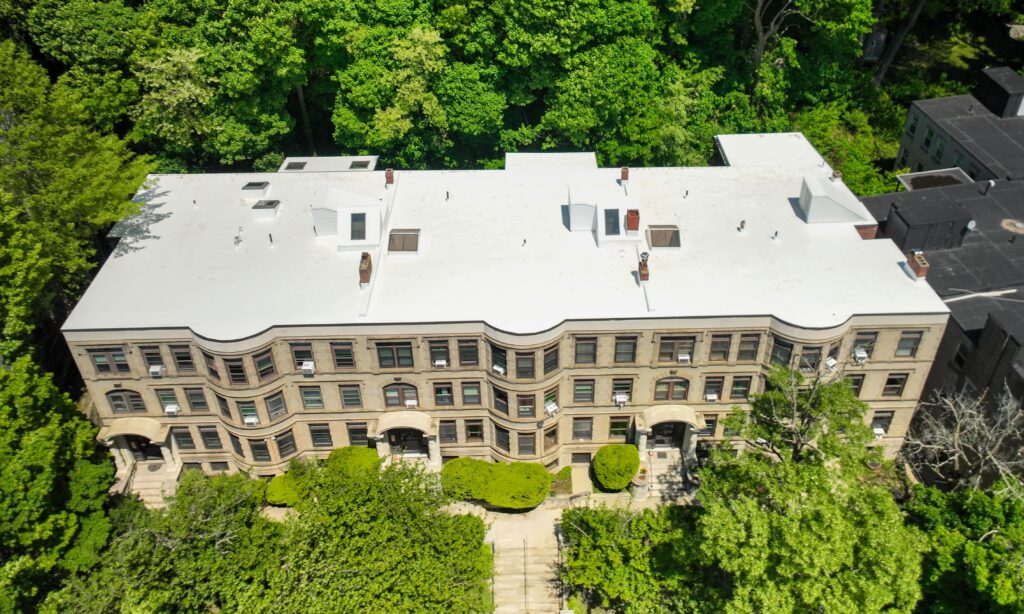
Service Life of PVC Roofing Membranes: Some Statistics
The average PVC roofing membrane made in the US has several key advantages, including fire resistance, easy installation, cost-effectiveness, long lifespan, chemical resistance, and suitability for various industries. These benefits make this synthetic single-ply material the prime choice for large, low-slope roofing areas.
Since synthetic membranes do not have so-called natural enemies but are immune to most negative factors, their service life is calculated at 20, 30, or even more years.
So, how long does a PVC roof last? Most PVC roofs can last for more than two decades, with a lifespan of around 20-30 years, depending on installation and maintenance practices.
The average membrane made of polyvinylchloride lasts at least 20 years. However, if you inspect the condition of your roof at least several times a season and carry out timely repairs, this figure can be up to 35-40 years.
❎ Please note! To take advantage of the manufacturer’s guaranteed service, you must contact certified roofers to install membranes and use the equipment and technologies the manufacturer recommends during installation and maintenance.
How Long Does PVC Roof Last: Brand, Model, and Technique
The average service life of any roofing material depends on a set of factors, both those that you can influence and those that do not depend on your choice. For example, service life directly depends on what material you choose for your project and how you install it.
A few words about installation technologies
An ideal PVC roofing system is smooth, extremely durable (compared to EPDM), perfectly sealed, monolithic, and securely fixed to the roofing base. This ensures both ease of everyday use and a prolonged service life of several decades. The tightness and reliable fixed surface are achieved through hot-welded seam technology, which tightly connects the membrane sheets into one whole. It is essential to hire a commercial roofing specialist to ensure proper installation and maintenance. Evaluating factors such as the current roof condition, location and climate, and future usage plans is also crucial when choosing a PVC roofing system.
Another critical factor influencing service life is the design of proper drainage to remove melt or rainwater.
In addition, you should install so-called flashings designed to protect the building structure from potential leaks. If you neglect high-quality and professionally done welding or designing a suitable drainage system, your roof will last 1-2 seasons in the best-case scenario.
A few words about different brands
Several popular brands and roofing products are made from polyvinyl chloride, which is added to various polymers to improve elasticity, UV resistance, etc.
In the context of extended service life, it is essential to remember that membranes can be thin or thick (40 to 80 mils). The thicker the material, the more difficult it is to damage mechanically and the longer it can be used. Also, membranes can be reinforced using fiberglass (or some other rigid and durable materials) or non-reinforced.
Thick and reinforced materials (even single-ply) are generally used when installing commercial roofs, and thin membranes are laid on the roofs of private houses and extensions. The first option is usually more expensive, and the second option is cheaper, but the guaranteed service life of thin and non-reinforced membranes is slightly shorter.
Hiring a professional roofing contractor ensures the longevity of your PVC roof. They have the expertise to properly install the roofing material, design effective drainage systems, and perform high-quality welding, all essential for a durable and long-lasting roof.
How Long Do PVC Roofs Last: Factors Affecting the Service Life
We have already discussed the factors that affect service life. Those factors depend directly on the qualifications of roofers and those who select membranes for a specific project. We cannot influence environmental factors.
The main enemy of any PVC roof material is the sun’s rays, specifically ultraviolet (UV) rays. Under UV rays, PVC membranes lose their elasticity and crack, and areas prone to leaks appear on their surface. The same thing can happen even with properly hot-welded seams. To increase the service life and further protect the membranes from this negative factor, manufacturers add special stabilizers to PVC. This makes PVC a durable roofing solution capable of withstanding harsh sunlight.
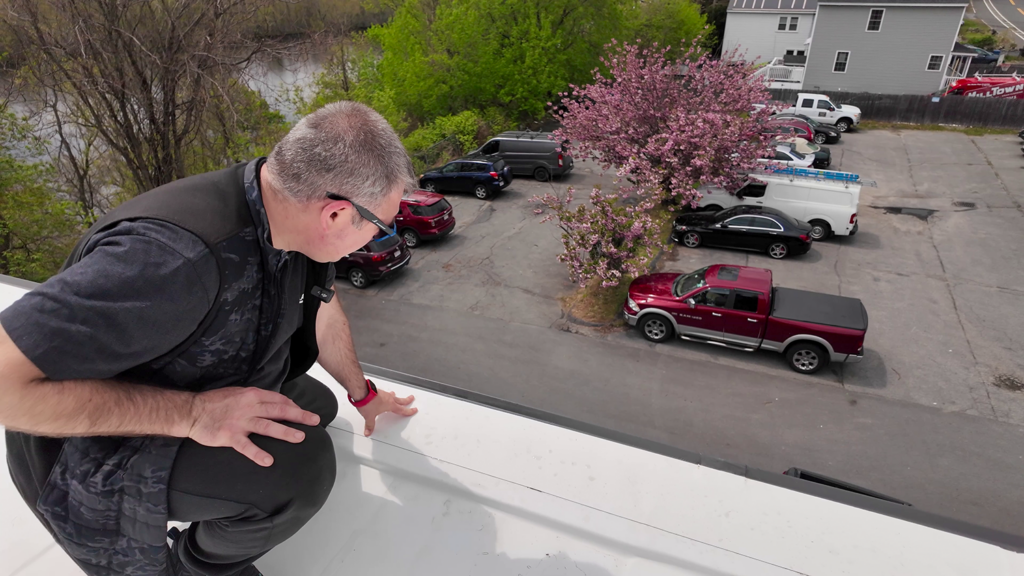
PVC membranes can also be damaged mechanically by piercing and puncturing them with a sharp object or damaging the surface with inappropriate shoes. Even though synthetic materials are durable (compared to rubber materials), they can still be damaged.
Additional negative factors include hail, hurricanes, heavy rain, and snowfall. However, if the roof membrane is chosen and installed correctly, PVC membranes are designed to withstand any weather event (except extreme ones like a tornado or very large hail). This resistance to various climate conditions further solidifies PVC as a reliable roofing solution.
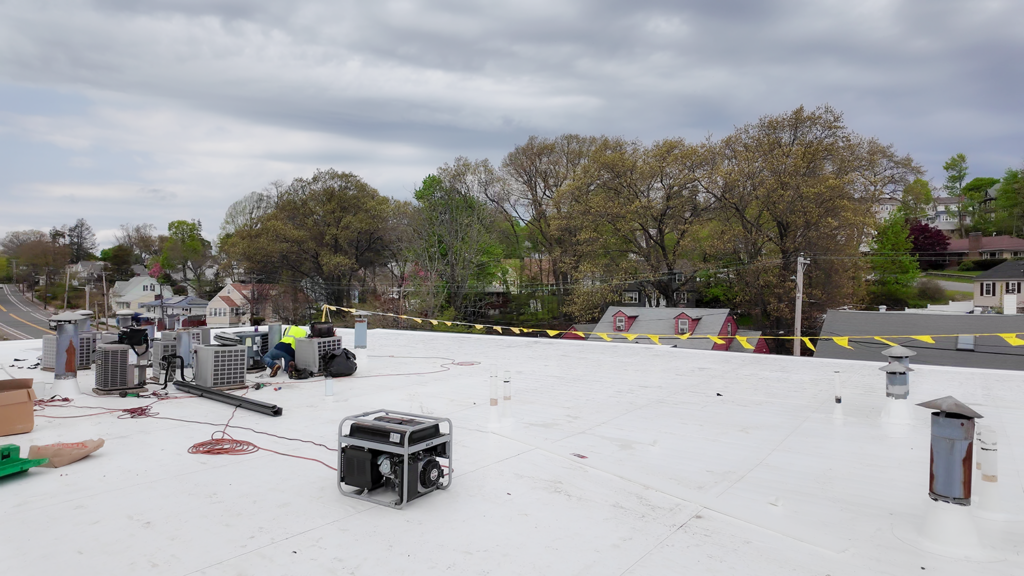
PVC roofs are maintenance-free, but it does not mean that you should give up seasonal inspections. Proper maintenance, including regular inspections and timely repairs, is crucial for extending the lifespan of PVC roofs. To avoid unpleasant surprises, emergency repairs, or leaks at the most inopportune moment, we recommend periodically checking your roof, especially after heavy rains or snowfalls. Remember safety precautions when working at height, use safety equipment, or contact a local roofer who will inspect your roof professionally.
Service Life of PVC Roofs: Main Negative Factors
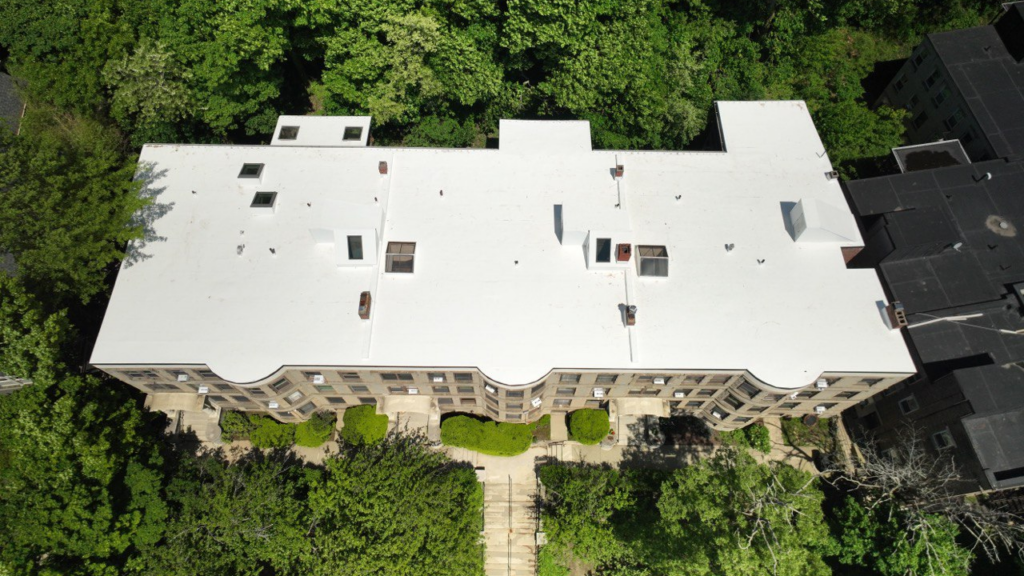
Unqualified installation
Poor quality, unprofessional, and incorrect installation are reasons why PVC membranes last only 1-2 years instead of 20-30 years. Hiring commercial roofing specialists is crucial to avoid unqualified installation and ensure the roof’s longevity. They are also equipped to handle emergency repair services for commercial roofing, addressing urgent issues related to your commercial roof. Laying the membrane without proper overlapping, with leaking T-joints, without flashing near corners, dormer windows, and other roof structures, and accumulating ponding water on the flat surface due to the lack of a drainage system are just a few of the problems that unprofessional installation leads to.
Punctures
Physical damage from foot traffic, falling debris, or other mechanical impacts can compromise the integrity of the PVC membrane, especially on a flat roof. PVC roofs are known for their durability and weather resistance, making them particularly suitable for flat roofs in commercial, industrial, and institutional buildings. Protective measures, such as walkways or barriers, can help minimize damage. Additionally, you can choose a thicker and reinforced membrane if you know the roof will be subject to foot traffic.
Chemicals
Exposure to harsh chemicals, oils, and industrial pollutants can degrade PVC surfaces over time. While PVC is generally resistant to many chemicals, prolonged or excessive exposure can cause damage. For industries that use aggressive chemicals, special membranes must be chosen. Consult with a qualified roofer or a representative of the PVC materials manufacturer.
Lack of maintenance
As we said earlier, PVC does not require constant inspections and repairs. Still, after heavy rains and hurricanes, as well as after snowfalls and after leaks are detected, it is recommended to inspect the condition of the membrane, including seams, gutters, and flashings.
Maintenance Tips for Homeowners

- ✅ Conduct inspections at least twice yearly, especially after severe weather events, to identify and eliminate potential issues early. This is particularly important for PVC roofing systems, as they require regular checks to maintain their fire resistance, chemical resistance, and overall lifespan.
- ✅ To prevent further deterioration, immediately check the roof for leaks, cracks, or other damages.
- ✅ Remove debris to prevent standing water, which can damage the membrane over time.
- ✅ Use UV-protective coatings and pathways to minimize physical and environmental damage.
- ✅ Professional maintenance services can ensure thorough inspections and effective repairs for large roofs.
Comparison of PVC and Rubber Roofing
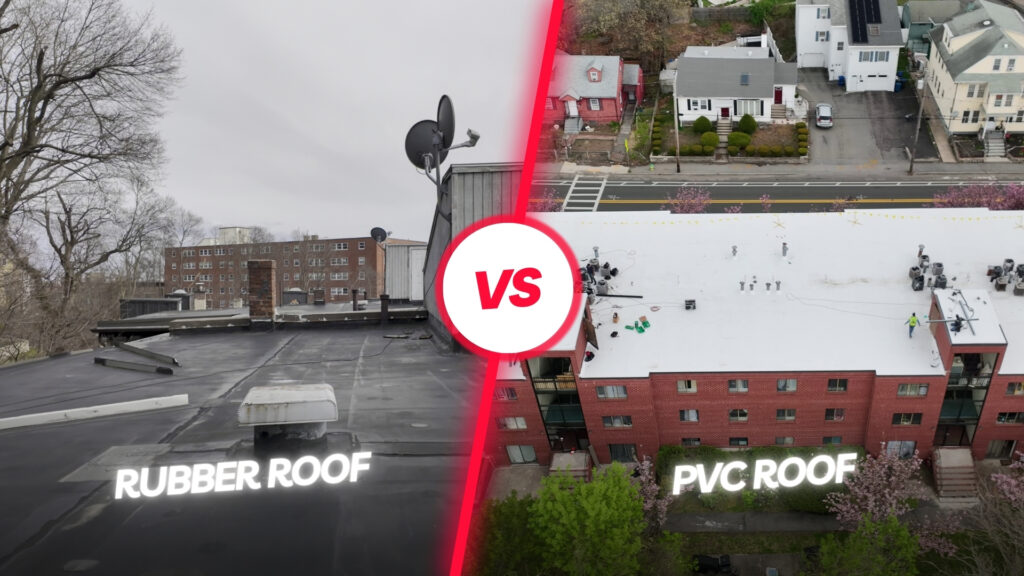
Manufacturers of PVC single-layer membranes position their product as an alternative to time-tested roofing technologies such as rubber and EPDM. Let’s compare both roofing materials, considering their benefits, drawbacks, resistance to harmful factors, and stated service life.
The average service life of single-layer PVC membranes is 20 years, and the maximum service life of reinforced analogs is up to 40 years. For rubber roofing, these indicators are much lower – 10 and 25 years for reinforced membranes (or even less if the membrane is installed with mistakes). Even though high-quality rubber roofing is usually resistant to moisture and UV rays, its weak point is the seams, which are glued together rather than welded. Due to the use of adhesives, the service life of a rubber roof is not so long, and after several years, even the professionally made and installed EPDM roof can face leaking over time.
PVC membranes are supposed to resist fire, wind, chemicals, and punctures. They also offer excellent resistance to weather conditions, making them suitable for the US climate. EPDM is known for its better resistance to UV radiation, ozone, and temperature extremes. However, compared to PVC, it is more prone to physical damage, including damage from foot traffic.
Some PVC membranes (predominantly white and light-grey membranes) are highly reflective, reducing heat absorption from sun rays and lowering cooling costs. Although the initial cost of PVC membranes may be higher, such roofs can be a profitable investment that reduces monthly electricity bills. Most of the EPDM materials available on the US market are typically black. They attract heat, especially in the summer, affecting the air conditioning operation. While you can find white rubber membranes, they are less common and more costly.
PVC membranes should be installed using specific heat-welding tools, which create strong, seamless, and anti-leak surfaces. This method also allows for quick and efficient installation. However, it requires the involvement of qualified roofers. EPDM roofs are installed in other ways, including adhesives or special tape to seal the seams. However, as mentioned above, this installation method has drawbacks over a long distance. In addition, maintenance of rubber roofs is more expensive, and according to statistics, it needs to be carried out more often.
PVC Roofing is probably the prime choice for commercial projects
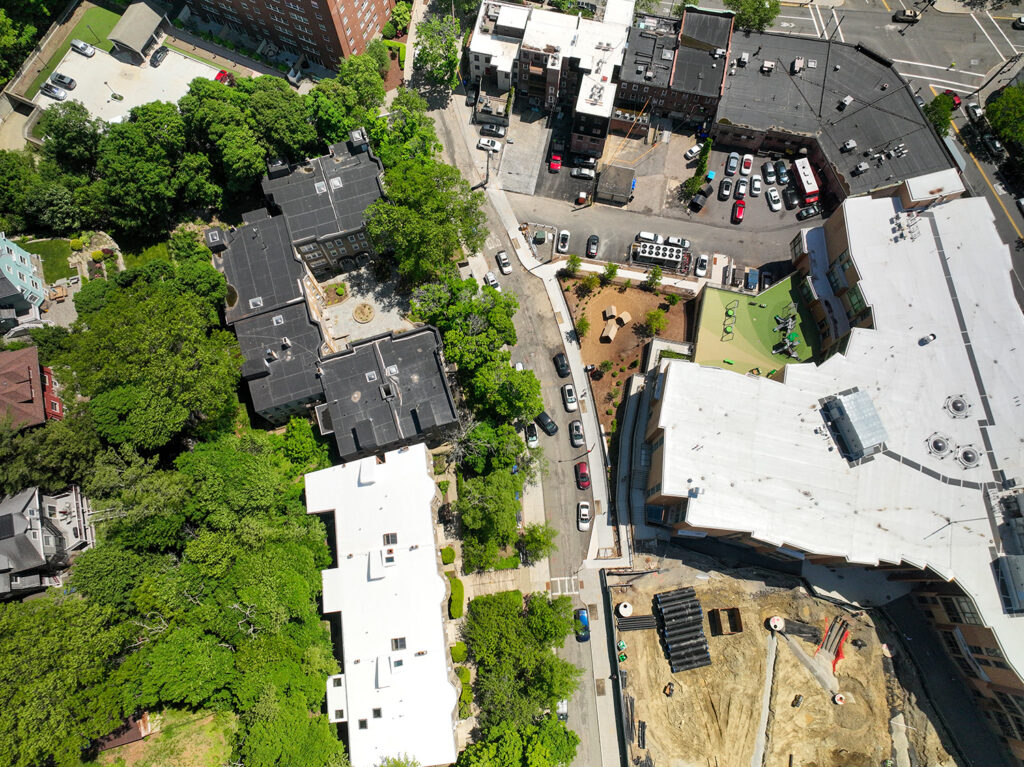
The incredibly thick and reinforced PVC membranes guarantee decades of protection against leaks, making them ideal for commercial roofs.
Thanks to the technology of hot-air welded seams, PVC membranes guarantee long-term anti-leak protection. This period is much longer than that of rubber and other roofs installed using adhesive or tape technology.
PVC’s resistance to mechanical damage makes it a preferable choice for some commercial properties, where the roof is often subject to more significant stress.
The reflective properties of PVC membranes lead to lower cooling costs and improved energy efficiency. This is particularly beneficial for commercial buildings with large roof surfaces.
PVC roofs require less maintenance than EPDM roofs, often requiring regular seam re-sealing. This results in lower maintenance costs and less disruption to building operations.
PVC’s recyclability and energy-efficient properties contribute to a reduced environmental impact, aligning with the growing emphasis on sustainability in residential and commercial construction.
Let’s sum it up
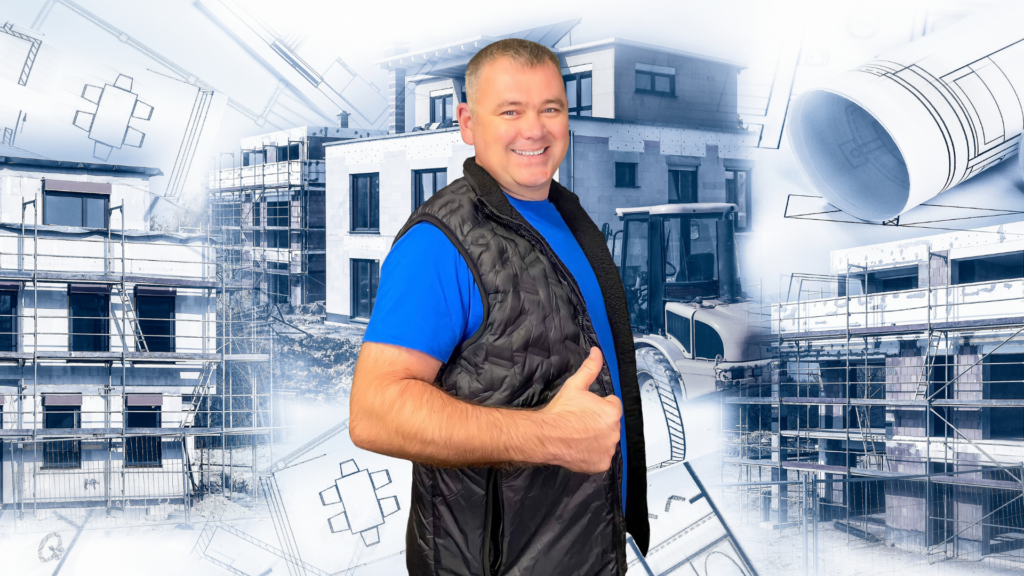
Like any roofing material available on the US market, single-ply PVC membranes (thick and thin, reinforced and non-reinforced) have their strengths and limitations. However, one of the indisputable advantages of this material is prolonged service life, which is achieved both due to the features of the membranes themselves and the features of the installation technology. PVC roofing is a durable and efficient solution for various applications, providing energy efficiency and chemical resistance benefits.
Compared to rubber roofs, PVC materials have their aces up their sleeves – almost doubled service life, no need for constant maintenance, energy efficiency, and better resistance to foot traffic and mechanical stress.
In conclusion, we would like to remind you that to gain access to all the potential benefits of the material, it is better to select the correct membrane considering the operating conditions and properly install, maintain, and repair it by seeking professional services.
Denis is the driving force behind ID Flat Roof, a leading company in Boston specializing in flat roof repair and installation for over 20 years.
Expertise:
Denis excels in PVC, TPO, EPDM, and rubber roofing. His meticulous approach ensures quality and customer satisfaction.
Innovation:
Denis incorporates cutting-edge solutions like skylights and solar PV roofing.



